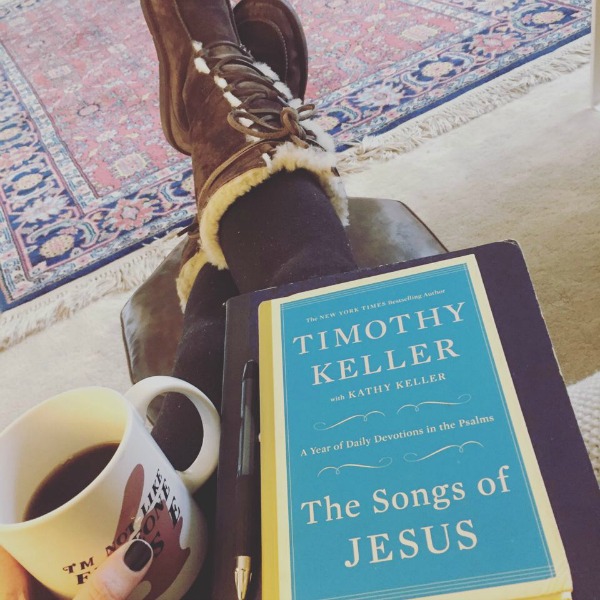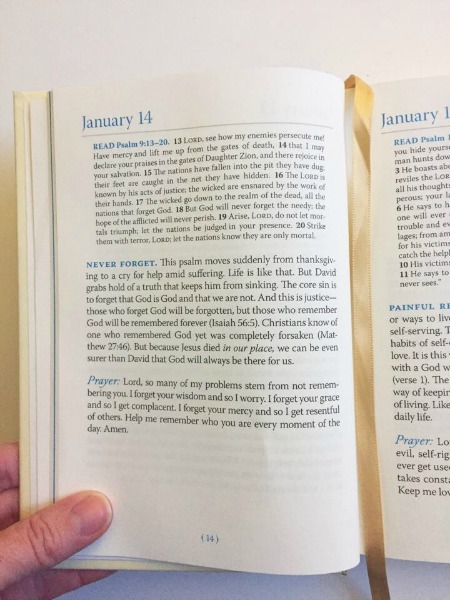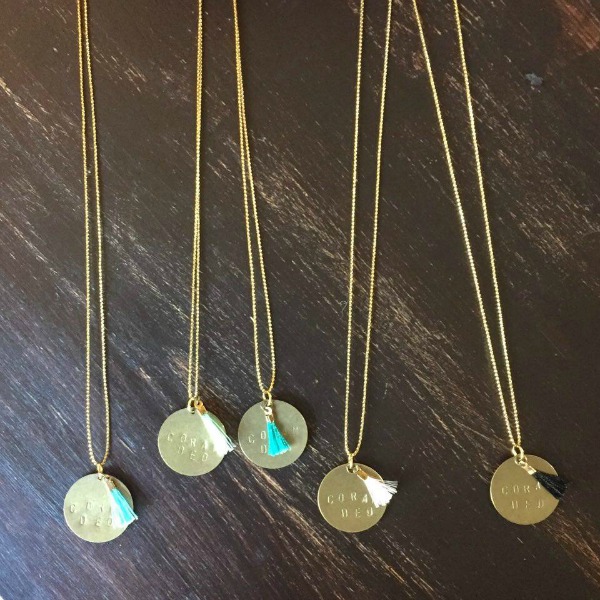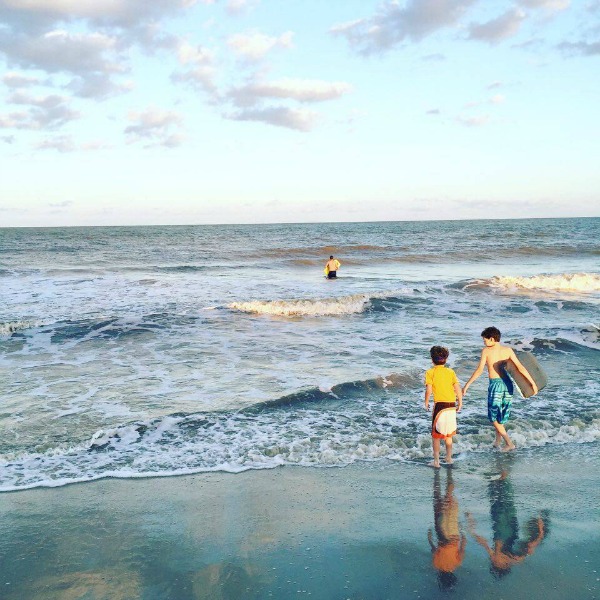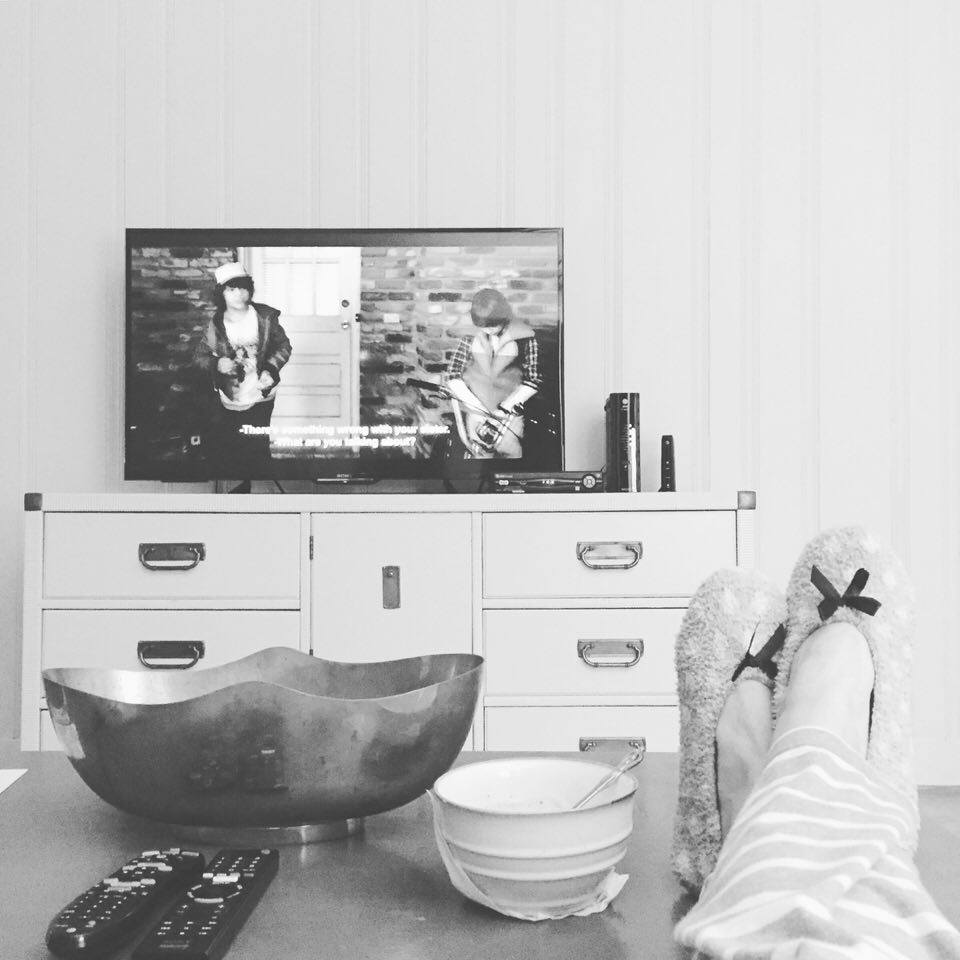
What does it look like to receive your right-now life just as it is and not how you want it to be?
What does it look like to receive this season of work you wish you didn’t have to do? What does it look like to receive this season of parenting? Of marriage? Of income? Of keeping so many plates spinning, you’re positively dizzy?
That’s been the purpose of this series — to encourage your soul in the midst of your right-now season and to provide you with practical tips to make the “receiving” a little bit easier.
We’ve talked about feeding your soul — why it matters and how to do it. And we’ve talked about why self-care matters, especially if you want to live a life defined by love.
Today, we’re getting super practical about everyday self-care and I’m reporting to you directly from the trenches. I’ve taken on too much work in the middle of a family season that also’s a bit too much. I feel stretched in every way and have had to accept that I’ll be a little bonkers until the end of the school year.
When life looks like this, we can proceed with fists clenched or we can proceed with palms open, receiving this season for what it is and opening our hearts to the ways God wants to love us, provide for us, and gently teach us.

One of the ways He provides is through opening my eyes to “everyday self-care.” I’m not talking about massages and pedicures. I’m talking about daily rhythms and practices that help us to care for ourselves so that we can receive our right-now season of life (craziness and all) and better love those around us.
Here are 5 real-life ways you too can practice everyday self-care:
1. Do normal things slowly and with care.
During the holidays I listened to this podcast on self-care from The Lazy Genius. She talked about slowing down when you wash your face at night. And so I did.
You guys, do you realize that you don’t have to hurry when you wash your face? You can take the time to massage the cleanser into your skin, to slowly rinse your face with care, to gently pat your moisturizer onto your face. It turns a daily chore into a loving ritual. I feel like it helps to calm my brain and my body before bedtime.
I now do the same thing when I wash my hair, massaging my scalp with my fingertips in the same way my sweet hairdresser does. Why have we not being treating ourselves to these daily luxuries?

If you had a friend who was struggling in some way, who needed your help to wash her face or hair, how would you care for her? Gently and with tenderness. Care for yourself in the kind way you would care for a friend. (I’ll say this a lot.)
Whether it’s a long shower at the end of the day, a warm bath instead of scrolling through Facebook, or washing your dishes slowly in a sudsy sink of hot water, the possibility of daily luxury is all around you. Treat yourself.
2. Kick hurry to the curb.
A couple of months ago I went to the grocery store mid-morning. It was a rare day of not having a super pressing agenda, so I gifted myself a latte from the in-store Starbucks and took my time through the aisles. Over and over, I said to myself: “Slow down. There is no need to rush.”
After I checked out and loaded my groceries into the car, I felt strangely relaxed and peaceful. Slowing down and sipping coffee had somehow turned a regular chore into a treat. I considered how I’m constantly in a hurry, even when I don’t have to be.
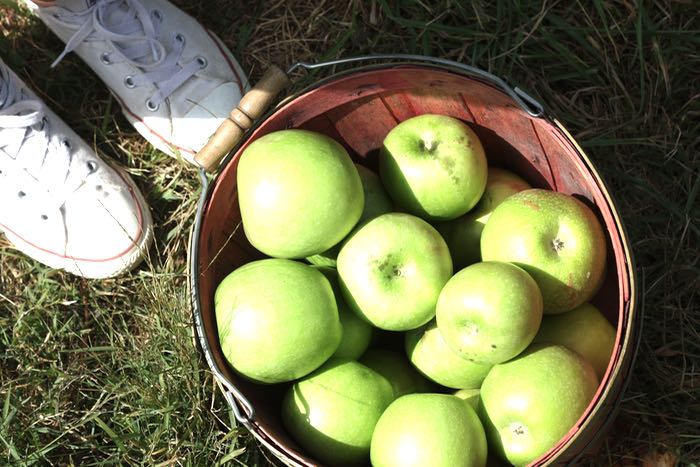
I realize we don’t always have that luxury. You may have small children who accompany you everywhere or you’re squeezing in a grocery run before school pick-up. But when you’re doing a regular chore and you don’t have to hurry, be kind to yourself and value slowness over productivity. When I slow my pace and my mind, it’s as if anxiety runs out of gas and stalls, leaving me with a rare sense of calm.
As I’ve considered the life of Christ, I’ve noticed that he was never in a rush. We tend to assume this was a cultural state of mind, yet there are so many stories in Scripture of those around him hurrying and scurrying, frantic and panicked about all sorts of things. But Jesus never responded with hurry or stress, which tells me that’s not his intention for us either.
He is a God of peace and he calls us to be people of peace — in our inner lives and in the world around us. How can we be instruments of peace if we remain in a state of hurry and stress?
When a season of life is extra crazy, when we are struggling to receive it because we just want to get to the other side, hurry may be our default but it’s not our friend. Stressful seasons are the most important times to weave rhythms of slowness into our days.
3. Live within your means.
I don’t mean in a financial sense, though that totally applies. I’m referring to your energy level, your mental and emotional state, your relationships, your calendar, your commitments, your current season.
In my next post, I’ll tell you about an entire year of rest I had to take about 6 years ago. The reasons are long are complicated but a big part of the equation was my refusal, for years on end, to honor my own limitations. I was spinning my wheels in good, but misplaced directions.

I wasn’t the only one who paid for it. For a long season of recovery, I had little to give anyone. When we don’t honor our God-given limitations, we will eventually fall apart, making it impossible to live a life defined by love.
{For more on this topic of honoring our limitations, see my last post: The Secret to Practicing Self-Care in Your Crazy, Right-Now Life.}
If your right-now life feels bananas, if you’re living beyond your means but you can’t take anything off your plate {it happens}, choose not to add anything else to it. Finish what you must and then resolve to move forward with intention. In the words of St. Benedict, “Always we begin again.”
4. Work with what you have, right where you are.
There is a holy hush that comes over my mind and soul when I quit wrestling and simply receive what is mine with gratitude. This applies to everything from my home and possessions, to the opportunities I have…and don’t have.

This series I’m writing, while precious to me, has unfolded far more slowly than I planned. I have had to honor my limitations in the form of time and energy, which means I write in the smallest slivers of my full schedule and publish less often. I worry that I’m losing momentum and my writing skills, that people won’t keep reading, that the deep longings I have to encourage others as I write from my own heart will go unmet and unblessed. When I look around and see writers passing me by, it’s easy to lose heart, to panic, to throw in the towel.
This verse comforts me:
Lord, you alone are my portion and my cup; you make my lot secure. The boundary lines have fallen for me in pleasant places; surely I have a delightful inheritance. Psalm 16:5-6 (NIV)
Living a “limitless” life is not the goal. Notice that the psalmist is thanking God for boundary lines. Our good Father knows what we truly need and what we don’t. He alone is our portion and our provider. We can trust him with the limitations he’s placed in our lives, knowing that they provide protection or perhaps just a necessary pause.
We waste precious mental and emotional energy comparing our lives to others. We cannot simultaneously reach for what is not ours and receive what is ours. We can only do one or the other.
5. Feed yourself.
I’m talking about spiritual food and actual food. When our lives are especially crazy, we tend to neglect the most basic necessities, like nourishment.
As I said in an earlier post of this series, we can get a little crazy when we don’t eat. We lose all perspective. We despair. We cry. We don’t think or feel or act as we should. We act like young children with low blood sugar.
When I began to see Scripture as my food, it changed everything. It helped me prioritize time with God in his word, not merely as a spiritual discipline but as the daily sustenance I desperately needed.
The same is true for the actual food we eat. I love this illustration from Anne Lamott on teaching others to feed themselves in the same way they’d feed their beloved pastor if invited over for lunch or dinner:
They wouldn’t say, ‘Here Pastor, let’s eat standing up in the kitchen. This tube of barbecue Pringles is all for you. I have my own,’ and then stand there gobbling from their own tubular container.
No, they’d get out pretty dishes, and arrange wonderful foods on the plates, and set one plate before Veronica at the table, a plate filled with love, pride and connection. That’s what we have longed for, our whole lives, and get to create. From, A Few Quick Thoughts on That Diet You Are About to Fail

A couple of weeks ago my energy level was so low, I felt chronically sleepy and overwhelmed. How in the world was I going to do all the work set before me when all I wanted to do was nap? I couldn’t abandon my responsibilities or stop being a wife or leave my children as orphans. And even though I knew this commitment level would only be for a season, I still had to get through it.
As a last resort, I switched up my eating for this season I’m in, prioritizing my own nourishment. The details don’t matter because we’re all different in the ways we need to eat, but I will say this. As Anne Lamott advises, feed yourself with the care and intention you would employ if you were having your pastor or dear friend over for a meal.
The way you nourish yourself matters. Within a few days of making the changes I knew I needed to make, enough energy has returned for me to (hopefully) meet the daily demands of my current season. It’s impossible to receive your own life if you’re not feeding yourself in the most basic ways.
///
And on that note, let’s take a break and enjoy a snack. : )
Because I have more real-life tips for practicing self-care in your crazy, right-now life, there will be a Part 2 of this segment on everyday self-care. In the meantime, what practices would you like to begin implementing in your own life?
I’ll leave you with my favorite quote on self-care:
I have become clear about at least one thing: self-care is never a selfish act–it is simply good stewardship of the only gift I have, the gift I was put on earth to offer to others. Anytime we can listen to true self and give it the care it requires, we do so not only for ourselves but for the many others whose lives we touch. ~ Parker Palmer, Let Your Life Speak
///
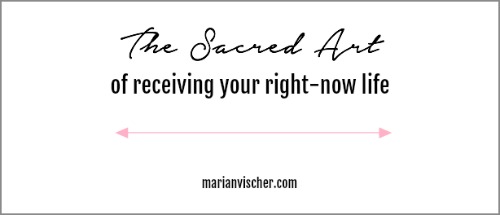
If this series sounds like something you need, all you have to do is subscribe to this online space. (You can do that in the box below this post.) If you’re already subscribed, yay! You’ll automatically receive it. The series is totally free.
Simply come and receive.
Whenever the latest installment of the series is published, you’ll be the first to know and you won’t miss a post.
Other posts in the series:
Post 1: How to Live Your Ordinary Life with Extraordinary Purpose
Post 2: The One Word that Forever Changed How I Approach the Bible
Post 3: When Your Right-Now Life Needs a Realistic Way to Study Scripture
Post 4: The Secret to Practicing Self-Care in Your Crazy, Right-Now Life
Click here to leave a question or comment. You can also chime in on social media. (Links below.)














